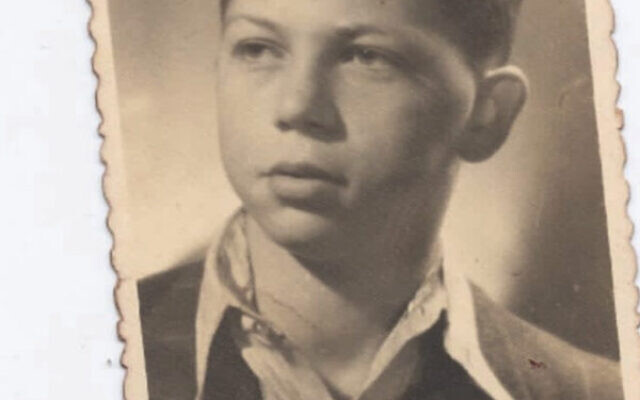When Suzy Zail talks about her father, you can hear the smile in her voice.
“We grew up under a rainbow. My father was this positive, trusting, wonderful man,” she recalled. Yet, she said, while her father never spoke about his experiences during the Holocaust and she grew up quite removed from that history, she always had a sense that it wasn’t necessarily safe to be a Jew. Suzy said it is this idea that has driven a lot of her writing.
“It’s what’s driven this book,” she said, referring to her latest novel Inkflower. “That sense that we have to keep talking about this, learning about it, writing about it and reading about it in the hope that maybe one day, we’ll get it right and treat each other right.”
Inkflower, geared towards young adults, is the story of a Holocaust survivor who only shares his story with his family once he is diagnosed with motor neurone disease (MND). It mirrors Suzy’s experience with her father.

Above: Suzy with her father in the hospital.
Suzy’s dad was diagnosed with MND and given six months to live. Before that, he had never uttered a word about his past. But when he received his diagnosis, he decided it was time to share his story. Suzy wrote everything down.
“My dad was always the guy who put the walls up,” Suzy explained. “He came to Australia and the day he landed, he put it behind him so he could move forward.”
Suzy’s dad even covered over his tattooed number with a flower because, according to the author, he didn’t feel like a number or a victim.
“He moved on and he never really talked about it again.”
Suzy recalled growing up with the same attitude, explaining that when her father died, she remembers thinking of him and smiling, rather than letting herself cry.
Until, that is, she sat down to write Inkflower.
The main difference between Suzy’s personal story and Inkflower is that Lisa – the main character – is 16, whereas Suzy was in her 30s when her father died. It meant she had to put herself into a teenager’s shoes.
“I remember sitting down and going, ‘How does it feel to be 16 and find out your father’s dying?’ and ‘How does it feel to listen to the story about a 13-year-old boy who is starving and scared, who just lost his parents and he’s in a cattle truck bound for Auschwitz?’”
Suzy said that knowing that teens feel things so deeply, everything is enormous and momentous, she had to really sink into those feelings.
“It was the first time I actually started bawling at my desk. I don’t think I even did that after he died. Because I gave myself permission to feel rather than to move on,” she said.
“Rather than give them six million, give them one child and they can understand…”
For Suzy, writing the book gave her another couple of years with her dad.
“I was alone in a room putting words on the page, but he was in it with me,” Suzy said with a smile in her voice, explaining that she loved listening to stories about her uncle whom she never met – he died a day before liberation.
“I spent about a month writing the story of their beautiful relationship and how his brother had saved his life; putting that dialogue in and having them play and laugh and cry, sleeping in the bunks next to each other in Auschwitz. I felt like I got to know the family I’d never met. There were so many hard things about it, but so many beautiful things too.”

Suzy said her dad’s story kept nagging at her, explaining that she kept getting drawn back to it. She was compelled to write the story down for young adults, because as far as she can see “nothing has really changed”.
“We’re [society] still hating on each other, we’re still hurting each other. There’s a rise in antisemitism and hate crimes,” she said. “I felt like I needed to give kids a character that they can relate to – a teenager with her own angst and own secrets. It seemed like the perfect audience to say, ‘This is what’s happening, these are the big issues, how do you want to take them on?’”
Suzy acknowledged that memoirs, photos and history books can be traumatising and at times, a bit numbing, especially for a younger audience. Leaning on a quote by Richard Powers – which says, “The best arguments in the world won’t change a person’s mind. The only thing that can do that is a good story” – Suzy sought to give her readers just that.
“I was alone in a room putting words on the page, but he was in it with me.”
“Rather than give them six million, give them one child and they can understand,” Suzy said. But, she explained, it’s just as important to provide hope. Which is why she included the alternating chapters with Lisa’s story, set in the ’80s which Suzy said was very fun to research.
“I always thread hope through my books, and there are always moments of light,” she said. “There are boyfriends and there are different elements to it, which I think [young adults] need, because a continuously unrelenting story, they just put it down. I think you need to show them also characters that are strong and brave, that they can kind of be inspired to emulate.”
For Suzy, the special part about it is that she has stayed true to her promise to tell her father’s story.
“The day he died I promised him that his story would be out in the world,” she said. “To feel like I’ve kept that promise, that children are also now reading his story and hopefully taking something important from it, is a beautiful thing.”
Inkflower is published by Walker Books, $22.99 rrp


comments